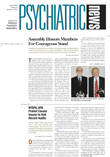The American Psychiatric Foundation is among the physician and advocacy groups sponsoring a new public service campaign to educate Americans about an often underrecognized side of depression: physical pain.
“One aspect of depression that is highly prevalent but not understood by the public is the relationship between aches and pains and depression,” said John S. McIntyre, M.D., a member of the Board of Directors of the American Psychiatric Foundation and a past president of APA.
“Many people don’t realize the significant overlap between physical and emotional symptoms.”
The campaign features the headline “Your Body May Know You’re Depressed Before You Do.” It is now appearing on billboards and transit advertising in four cities—Washington, D.C., Philadelphia, Chicago, and Atlanta—and will run for a minimum of three months.
The other campaign sponsors are the National Pain Foundation and Freedom From Fear, a patient advocacy organization.
Depression currently affects more than 19 million adults in the United States, and 57 percent of Americans have suffered from chronic pain.
The relationship between physical pain and depression manifests itself in many aspects of patients’ lives. Results of a survey conducted last May by Freedom From Fear during its National Anxiety Disorders Screening Day showed that 40 percent of respondents said that physical symptoms of depression and anxiety disrupt their work moderately, mostly, or extremely; 43 percent said that physical symptoms disrupt their social life moderately, mostly, or extremely; and 47 percent said that physical symptoms disrupt their family life/home responsibilities moderately, mostly, or extremely.
Recent research suggests that complete remission of depression is most likely to occur when all emotional and physical symptoms are eliminated.
“It is critical that people understand the relationship between pain and depression so that if they are suffering, they can talk to their physician about both their mood and their painful physical symptoms. This will give them the best chance for getting effective treatment,” said Rollin “Mac” Gallagher, M.D., M.P.H., a professor of psychiatry, anesthesiology, and public health at the Medical College of Pennsylvania and a member of the executive committee of the board of the National Pain Foundation.
More information about the campaign is posted on the Web at www.paindepressionlink.com, which provides links to the sites of the three participating organizations. ▪

